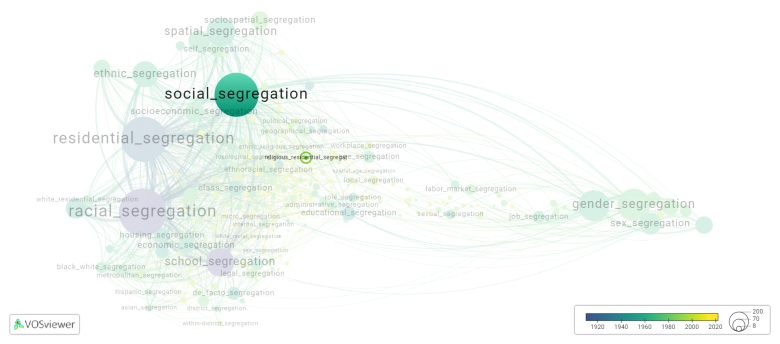Religious residential segregation
Date and country of first publication[1][edit | edit source]
1998
Ireland
Definition[edit | edit source]
Religious residential segregation refers to the separation of individuals or families based on their religious beliefs in housing and neighborhood settings. This can occur voluntarily as a result of individuals choosing to live in communities with others who share their religious beliefs, or it can be enforced through discriminatory practices by landlords, real estate agents, or homeowners' associations.
Religious residential segregation can have both positive and negative consequences. On one hand, individuals may feel a sense of belonging and community when they live in areas with others who share their beliefs, and they may have access to religious institutions, schools, and services that cater to their specific needs. However, this segregation can also lead to social isolation, lack of diversity, and potential discrimination against those who do not adhere to the dominant religious beliefs in the community.
Overall, religious residential segregation can contribute to the larger issue of social and cultural segregation, as individuals become increasingly isolated from those who are different from them and may not have opportunities to engage with people of diverse backgrounds and beliefs. This can perpetuate stereotypes, prejudice, and intolerance towards others who do not share the same religious beliefs. Promoting diversity, inclusion, and understanding in residential communities can help to address these issues and foster greater harmony among different religious groups.
See also[edit | edit source]
Related segregation forms[edit | edit source]
Religious residential segregation is frequently discussed in the literature with the following segregation forms:
social segregation, residential segregation

This visualization is based on the study The Multidisciplinary Landscape of Segregation Research.
For the complete network of interrelated segregation forms, please refer to:
References[edit | edit source]
Notes[edit | edit source]
- ↑ Date and country of first publication as informed by the Scopus database (December 2023).
At its current state, this definition has been generated by a Large Language Model (LLM) so far without review by an independent researcher or a member of the curating team of segregation experts that keep the Segregation Wiki online. While we strive for accuracy, we cannot guarantee its reliability, completeness and timeliness. Please use this content with caution and verify information as needed. Also, feel free to improve on the definition as you see fit, including the use of references and other informational resources. We value your input in enhancing the quality and accuracy of the definitions of segregation forms collectively offered in the Segregation Wiki ©.
Religious residential segregation appears in the following literature[edit | edit source]
McPeake J. (1998). Religion and residential search behaviour in the Belfast urban area. Housing Studies, 13(4), 527-548. https://doi.org/10.1080/02673039883254
Adair A.S., Berry J.N., McGreal W.S.J., Murtagh B., Paris C. (2). The local housing system in Craigavon, N. Ireland: Ethno religious residential Segregation, Socio tenurial polarisation and sub markets. Urban Studies, 37(7), 1079-1092. Carfax Publishing Company.https://doi.org/10.1080/00420980050032485
Gale R. (2013). Religious residential segregation and internal migration: The British Muslim case. Environment and Planning A, 45(4), 872-891. https://doi.org/10.1068/a4515
McAloney K. (2015). Perceptions of Segregation and Substance Use Behaviors in Adolescence. Journal of Child and Adolescent Substance Abuse, 24(5), 295-301. Routledge.https://doi.org/10.1080/1067828X.2013.829014
McPeake J. (2018). Owner occupier residential search in a divided city. Ethnicity Housing: Accommodating the Differences, 198-214. Taylor and Francis.https://doi.org/10.4324/9781315211282
